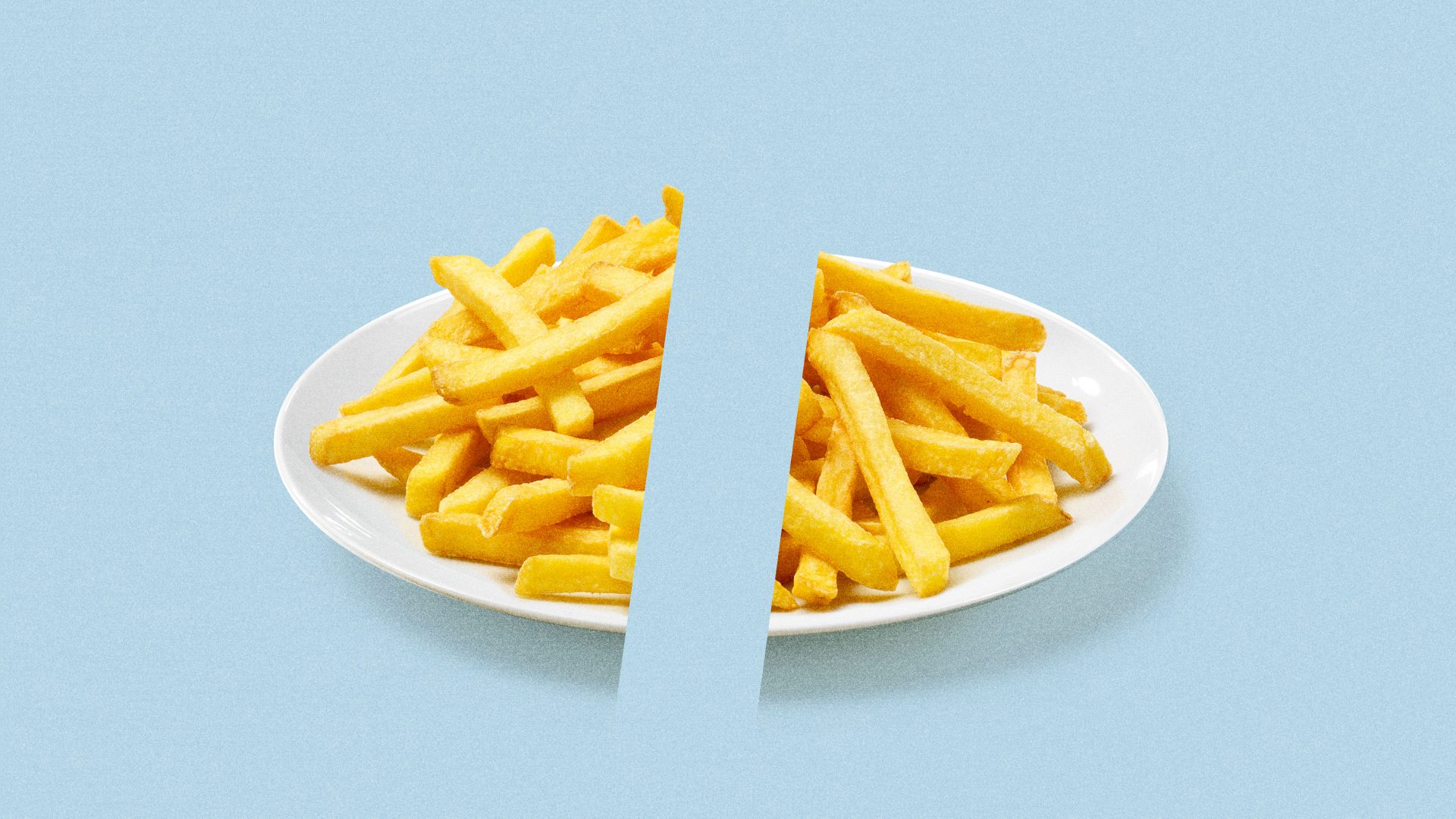The youngest, who does a lot of the cooking, asked what sort of potatoes I’d like with my cod – and I said: mashed, boiled – anything but chips, I think I may be post-chips. This set off a sort of furore in the house, as other family
members protested: How can you say you’re post-chips? That’s the sort of nonsense you’re always coming up with – a few years ago you claimed to be “post-image”, but now you spend entire evenings lolling moronically in front of the Kardashians.
No, I insisted – I really am post-chips. I’m not denying chips and I have form, that we go back a very long way indeed; neither am I claiming that I will never eat a chip – or indeed any other kind of deep-friend potato comestible,
such as a crisp – again in the future. But what I am stolidly maintaining is that my entirely reflex relationship with the chip as a staple is over.
And not just as a staple – as a snack, or especially as an accompaniment to a main course at a restaurant, in the form of a dear little golden-to-brown stook spilling from an adorable little zinc bucket. Stop! The youngest cried, that’s so last decade! You haven’t seen chips served like that in ages.
I have, I lied, I saw a homeless man lying outside the Tube station with a little zinc bucket full of chips only this morning… More howls of anger and disbelief. But anyway, even if I didn’t, the truth is that the simultaneous elevation of the chip into gastronomy, and its demotion, via pulverising and reconstitution (courtesy of any number of takeaways), into the soggy cardboard substratum of contemporary British poverty marks its nadir, for me – one from which there’s no possible return.
Which rather begs the question: when was its zenith? By the time (indeed, about a decade ago) those absurd miniature zinc buckets tink-tonked on to restaurant tables, the British chip was clearly in decline; a fall in status
simultaneously registered by people saying all manner of things – from aircraft carriers to cocaine, but excepting chips themselves – were “cheap as chips”. After the financial crash of 2007/8 any amount of money was magicked into being so as to keep the cosmic Ponzi scheme known as “the world economy” going – and a significant portion of it was then used to buy chips.
A couple of years later, in Wigan, I found smack and scraps barms still on sale for less than 50p. Smack being in this instance the local dialect for a giant sort of chip, rather than heroin, while a barm is a bread roll. Scraps, by
contrast, are the tiny twists and flakes of potato that detach from the chips during the deep-frying – some of these stuffed in a buttered bun are about the cheapest stomach-filler you can find in these isles… outside of a food bank.
Meanwhile, the bourgeois chip was on the rise – thin-cut, thick-cut, in wedges; skin on, skin off; twice and even triple-fried in anything from goose fat to beef dripping then coated in sea salt herbs and spices… treated, in short, like a commoner foodstuff about to marry into gastronomic royalty. And yet… and yet… où sont les frites d’antan? Because even as I crunched or otherwise bit down on these decadent variations on the once straightforward chip, I was transported back in time.
To the north London suburb of Finchley in the early 1970s, where, as soon as the bell rang, we would stampede from the classroom the local chippie, to be served with steaming piles of fat white chips in deftly furled paper cones, and balancing atop this munchy motherlode, either a pickled onion or a wally (cockney for a pickled gherkin). True, quite a few of the Jewish boys would go to the deli next door instead, and flout kashrut with four ounces of
pink ham, eaten straight from the wrapper.
Were they reacting – albeit unconsciously – to the unholy miscegenation of Ashkenazi fried fish with Belgian fried potatoes? Quite possibly, the important thing being that culinary cultures evolve with just such taboo-busting on all sides. Within my own lifetime rice and pasta were considered pretty damn exotic – while olive oil could only be sold on prescription. Once upon a time – a fact registered by the famous Glaswegian restaurant The
Ubiquitous Chip, which doesn’t in fact serve them – chips were supreme; yet while it’s perfectly acceptable to style yourself “post-colonial” to be post-chips remains beyond… the pale. Or possibly, the Pale.



